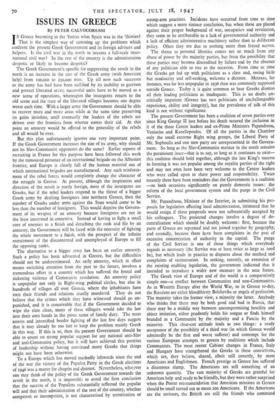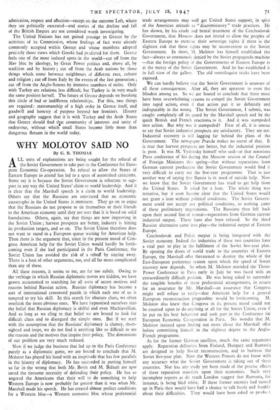ISSUES IN GREECE
By PETER CALVOCORESSI IS Greece becoming in the 'forties what Spain was in the 'thirties? That is the simplest way of summing up the problems which confront the present Greek Government and its foreign advisers and helpers. Is the civil war in the north to become a full-scale inter- national civil war? In The rest of the country is the administration despotic or likely to become despotic?
The Greek Government's specific for suppressing the revolt in the north is an increase in the size of the Greek army (with American help) from icio,000 to 25o,000 men. Up till now such successes as the army has had have been nullified by its inability to garrison and protect liberated areas; successful units have to be moved to a new scene of operations, whereupon the insurgents return to the old scene and the state of the liberated villages becomes one degree worse each time. With a larger army the Government should be able to recover more and more areas while at the same time preserving its gains inviolate, until eventually the leaders of the rebels are driven over the frontiers from whence comes their aid. At this point an amnesty would be offered to the generality of the rebels and all would be over.
But this plan unfortunately ignores one very important point. If the Greek Government increases the size of its army, why should not its Slav-Communist opponents do the same? Earlier reports of recruiting in France for this purpose have been followed this week by the rumoured presence of an international brigade on the Albanian frontier, and Europe is clearly full of the human material out of which international brigades are manufactured. Any such reinforce- ment of the rebel forces would completely change the character of the struggle in Greece. At present, although the inspiration and direction of the revolt is partly foreign, most of the insurgents are Greeks, but if the rebel leaders respond to the threat of a bigger Greek army by drafting foreigners into northern Greece, then the number of Greeks under arms against the State would come to be less than the number of foreigners. This would deprive the Govern- ment of its weapon of an amnesty because foreigners are not in the least interested in amnesties. Instead of having to fight a small core of enemies to a finish and detaching the rank and file by an amnesty, the Government will be faced with the necessity of fighting the whole movement to a finish, with the prospect of the infinite recruitment of the discontented and unemployed of Europe to fill the opposing ranks.
The alternative to a bigger army has been an earlier amnesty. Such a policy has been advocated in Greece, but the difficulties should not be underestimated. An early amnesty, which in effect means switching attention from the past to the future, involves a tremendous effort in a country which has suffered the brutal and sickening violence of Communist revolution. An amnesty policy is unpopular not only in Right-wing political circles, but also in hundreds of villages all over Greece, where the inhabitants have seen their friends and relations cruelly murdered. They do not believe that the crimes which they have witnessed should go un- punished, and it is conceivable that if the Government decided to wipe the slate clean, many of these villagers would take the law into their own hands in the pious name of family duty. The mass arrests and intensified border fighting of the last few days suggest that it may already be too late to keep the problem mainly Greek in this way. If this is so, then the present Government should be able to count on strong popular support for any national anti-Slav
and anti-Communist policy, but it will have achieved this position of leadership without having convinced many Greeks that things might not have been otherwise.
To a Europe which has moved markedly leftwards since the end of the war the victory of the Populist Party in the Greek elections of 1946 was a matter for chagrin and distrust. Nevertheless, whatever one may think of the policy of the Greek Government towards the revolt in the north, it is impossible to avoid the firm conclusion that the success of the Populists substantially reflected the popular will and that their administration of the rest of the country, whether competent or incompetent, is not characterised. by terrorisation or strong-arm practices. Incidents have occurred from time to time which suggest a more sinister conclusion, but when these are placed against their proper background of war, occupation and revolution, they seem to be attributable to a lack of governmental authority and a lack of efficient administrative machinery rather than to deliberate policy. Often they are due to nothing more than frayed nerves.
The threat to personal liberties comes not so much from any abuse of power by the majority parties, but from the possibility that these parties may become discredited by failure and by the absence of any politician able to rise to the occasion. From time to time the Greeks get fed up with politicians as a class and, seeing little but mediocrity and self-seeking, welcome a dictator. Metaxas, for instance, was far less unpopular in 1936 than was commonly supposed outside Greece. Today it is quite common to hear Greeks dismiss all their leading politicians as inadequate. This is no doubt un- critically impatient (Greece has two politicians of unchallengeable experience, ability and integrity), but the prevalence of talk of this kind is not without significance.
The present Government has been a coalition of seven parties ever since King George II just before his death secured the inclusion in it of the three Centre leaders and ex-Prime Ministers Papandreou, Veniselos and Kanellopoulos. Of all the parties in the Chamber only the small extreme Right wing groups, the Liberal Party of Mr. Sophoulis and one new party are unrepresented in the Govern- ment. So long as the Slav-Communist menace in the north remains the paramount issue—that is to say, so long as it continues to exist— this coalition should hold together, although the late King's success in forming it was not popular among the royalist parties of the right and may not even have been very welcome to the Centre leaders who were called upon to share power and responsibility. Twice recently there have been reminders that the Government is a coalition —on both occasions significantly on purely domestic issues : the reform of the local government system and the purge in the Civil Service.
Mr. Papandreou, Minister of the Interior, in submitting his pro- posals for legislation affecting local administration, intimated that he would resign if these proposals were not substantially accepted by his colleagues. The projected changes involve a degree of de- centralisation which should be doubly welcome: first, because the parts of Greece are separated and not joined together by geography, and secondly, because there have been complaints in the past of excessive concentration of authority in the capital. The purge of the Civil Service is one of those things which everybody regards as necessary (the Service was at least twice as large as need be), but which leads in practice to disputes about the method and complaints of victimisation. In seeking, recently, an extension of the existing enabling legislation, the government indicated that it intended to introduce a wider new measure in the near future.
The Greek view of Europe and of the world is a comparatively simple one—a conflict between Communists and non-Communists. As in Western Europe after the World War, so in Greece to-day, the Russians are either bloodthirsty Bolsheviks or angels of perfection. The majority takes the former view, a minority the latter. Anybody who thinks that there may be both good and bad in Russia, that there may be a middle way between uncomprdmising hostility and abject imitation, either prudently holds his tongue or finds himself branded as a Communist by the majority and a Fascist by the minority. This clear-cut attitude leads to two things : a ready acceptance of the possibility of a third war (in which Greece would admittedly be the first and worst sufferer) and contempt for the various European attempts to govern by coalitions which include Communists. The most recent Cabinet changes in France, Italy and Hungary have strengthened the Greeks in these convictions, which are, they believe, shared, albeit still covertly, by most Americans and Englishmen. French prestige in Greece has suffered a disastrous slump. The Americans are still something of an unknown quantity. The vast majority of Greeks are grateful for American help and ready to be friendly, but they were rather surprised when the Porter recommendation that American missions in Greece should be small turned out to mean 200 Americans. If the Americans are the saviours, the British are still the friends who command
admiration, respect and affection—except on the extreme Left, where they are politically execrated—and stories of the decline and fall of the British Empire are not considered worth investigating.
The United Nations has not gained prestige in Greece by the activities of its Commission, whose findings of fact were already commonly accepted within Greece and whose members adopted precisely those views which Greeks had predicted for them. Greece feels one of the most isolated spots in the world—cut off from the Slav bloc by ideology, by Great Power politics and, above all, by tradition and by history ; cut off from the Arab nations by those things which come between neighbours of different race, culture and religion ; cut off from Italy by the events of the last generation ; cut off from the Anzlo-Saxons by immense numbers of miles. Only with Turkey are relations less difficult, but Turkey is in very much the same position herself. The future of Greece depends on breaking this circle of bad or indifferent relationships. For this, two things are required: statesmanship of a high order in Greece itself, and goodwill and honesty of purpose beyond her frontiers. History and geography suggest that it is with Turkey and the Arab States that Greece should find that community of interests and unity of endeavour, without which small States become little more than dangerous flotsam in the world today,



































 Previous page
Previous page